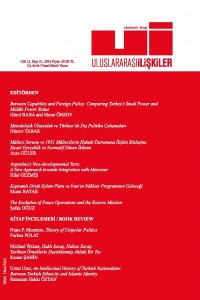Umut UZER, An Intellectual History of Turkish Nationalism:Between Turkish Ethnicity and Islamic Identity
Abstract
The scholarship on Turkish nationalism has traditionally focused on the late Ottoman Empire and the early Turkish Republic, often examining how the imperial ruling elites gradually came to terms with the transition from imperial attachments to narrower ethnic belongings. Since the early 2000s, however, as political Islam has begun to gain a more prominent position in Turkish political life, the studies on Turkish nationalism have also shifted gear. While scholars never really ditched aside the broader emphasis on the Ottoman origins, a range of new studies such as the ones by Soner Çağaptay, Gavin D. Brockett, Behlül Özkan, and Jenny White began to tackle the rise of what one may call the conservative and Islamist strands of Turkish nationalism since the Second World War.
References
- .......
Umut UZER, An Intellectual History of Turkish Nationalism: Between Turkish Ethnicity and Islamic Identity
Abstract
The scholarship on Turkish nationalism has traditionally focused on the late Ottoman Empire and the early Turkish Republic, often examining how the imperial ruling elites gradually came to terms with the transition from imperial attachments to narrower ethnic belongings. Since the early 2000s, however, as political Islam has begun to gain a more prominent position in Turkish political life, the studies on Turkish nationalism have also shifted gear. While scholars never really ditched aside the broader emphasis on the Ottoman origins, a range of new studies such as the ones by Soner Çağaptay, Gavin D. Brockett, Behlül Özkan, and Jenny White began to tackle the rise of what one may call the conservative and Islamist strands of Turkish nationalism since the Second World War.
Keywords
References
- .......
Details
| Primary Language | English |
|---|---|
| Other ID | JA72NR59MM |
| Journal Section | Book Review |
| Authors | |
| Publication Date | October 20, 2016 |
| Published in Issue | Year 2016 Volume: 13 Issue: 51 |


